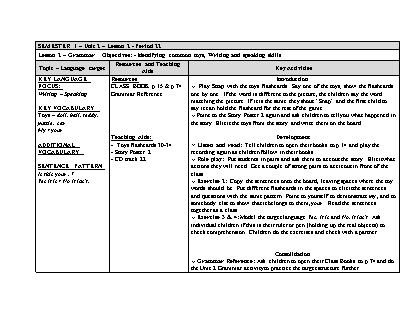Giáo án Tiếng Anh Lớp 3 - Unit 2 - Lesson 2 - Period 22

Introduction
Play Snap with the toys flashcards. Say one of the toys; show the flashcards one by one. If the word is different to the picture, the children say the word matching the picture. If it is the same they shout “Snap” and the first child to say it can hold the flashcard for the rest of the game.
Point to the Story Poster 2 again and ask children to tell you what happened in the story. Elicit the toys from the story and write them on the board.
Development
Listen and read: Tell children to open their books to p.14 and play the recording again as children follow in their books.
Role play: Put students in pairs and ask them to act out the story. Elicit what actions they will need. Get a couple of strong pairs to act it out in front of the class.
Exercise 2: Copy the sentences onto the board, leaving spaces where the toy words should be. Put different flashcards in the spaces to elicit the sentences and questions with the same pattern. Point to yourself to demonstrate my, and to somebody else to show that it belongs to them, your. Read the sentences together as a class.
Exercise 3 & 4: Model the target language Yes, it is and No, it isn’t. Ask individual children if this is their ruler or pen (holding up the real objects) to check comprehension. Children do the exercises and check with a partner.
SEMESTER 1 – Unit 2 – Lesson 2 - Period 22 Lesson 2 – Grammar Objectives: - Identifying common toys, Writing and speaking skills Topic – Language target Resources and Teaching Aids Key Activities KEY LANGUAGE FOCUS: Writing – Speaking KEY VOCABULARY Toys – doll, ball, teddy, puzzle, car My / your ADDITIONAL VOCABULARY SENTENCE PATTERN Is this your ? Yes it is / No it isn’t. Resources CLASS BOOK p.15 & p.74 Grammar Reference Teaching Aids: - Toys flashcards 30-34 - Story Poster 2 - CD track 22 Introduction a Play Snap with the toys flashcards. Say one of the toys; show the flashcards one by one. If the word is different to the picture, the children say the word matching the picture. If it is the same they shout “Snap” and the first child to say it can hold the flashcard for the rest of the game. aPoint to the Story Poster 2 again and ask children to tell you what happened in the story. Elicit the toys from the story and write them on the board. Development aListen and read: Tell children to open their books to p.14 and play the recording again as children follow in their books. aRole play: Put students in pairs and ask them to act out the story. Elicit what actions they will need. Get a couple of strong pairs to act it out in front of the class. aExercise 2: Copy the sentences onto the board, leaving spaces where the toy words should be. Put different flashcards in the spaces to elicit the sentences and questions with the same pattern. Point to yourself to demonstrate my, and to somebody else to show that it belongs to them, your. Read the sentences together as a class. aExercise 3 & 4: Model the target language Yes, it is and No, it isn’t. Ask individual children if this is their ruler or pen (holding up the real objects) to check comprehension. Children do the exercises and check with a partner. Consolidation aGrammar Reference: Ask children to open their Class Books to p.74 and do the Unit 2 Grammar activity to practice the target structure further.
Tài liệu đính kèm:
 giao_an_tieng_anh_lop_3_unit_2_lesson_1_period_22.doc
giao_an_tieng_anh_lop_3_unit_2_lesson_1_period_22.doc



